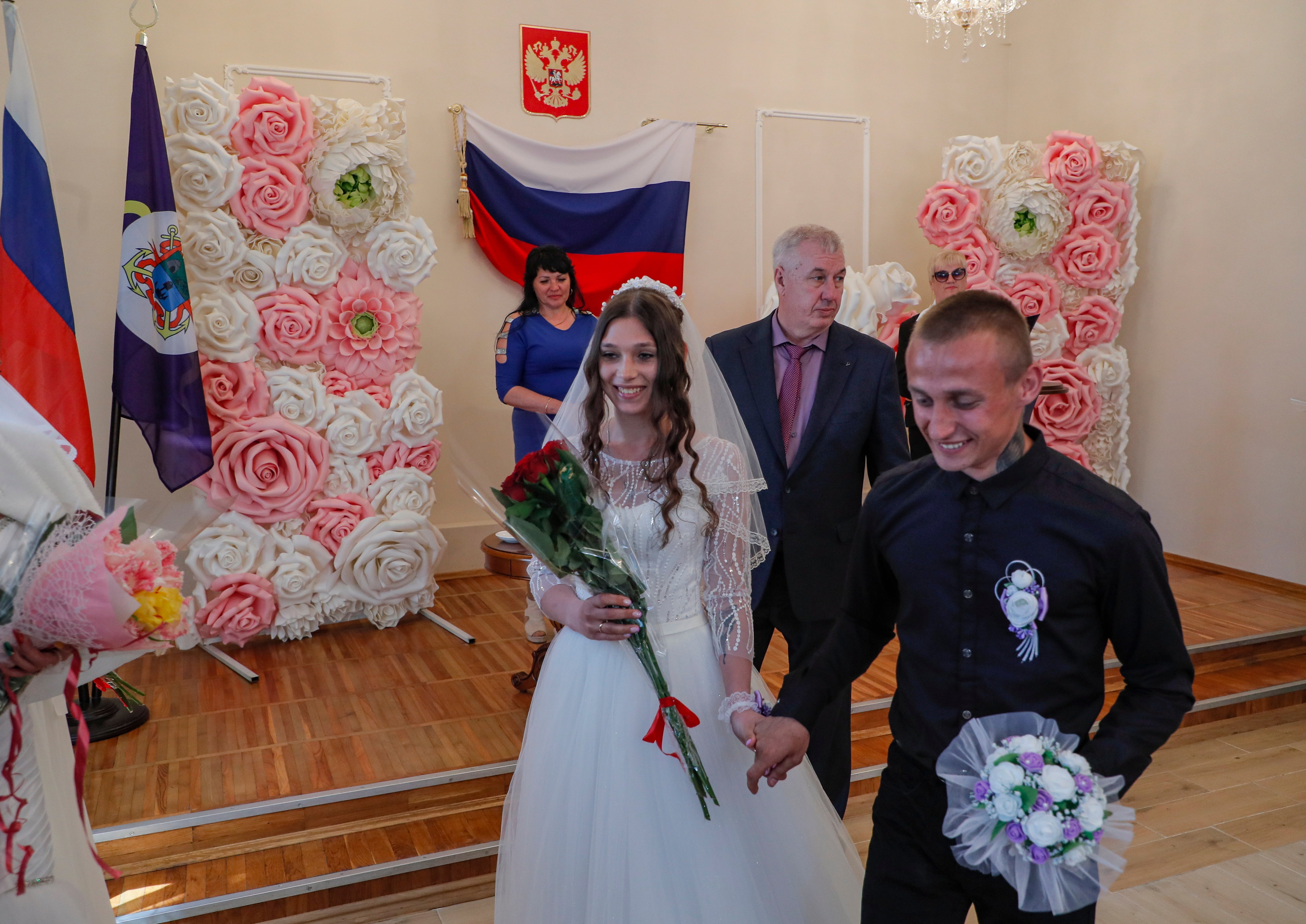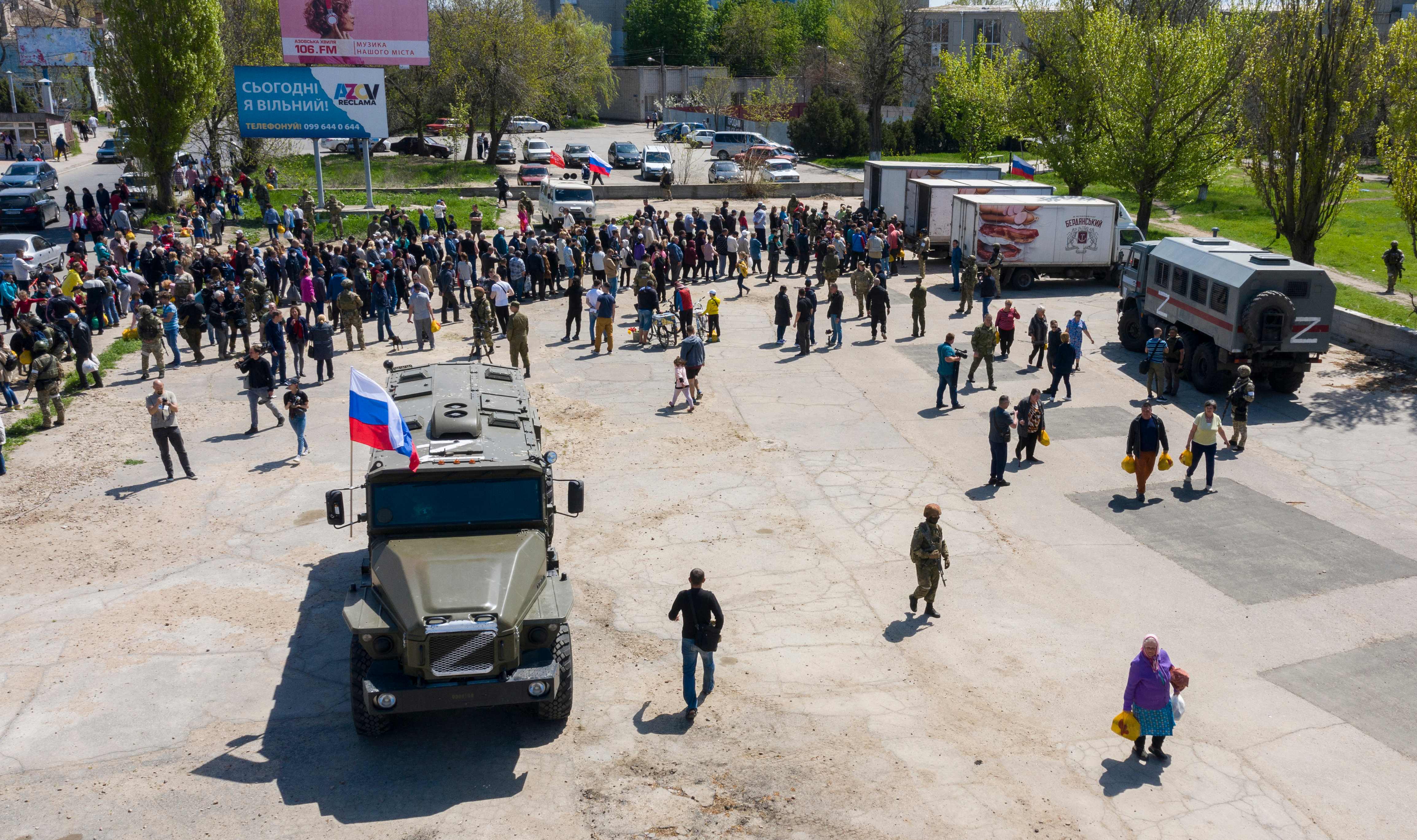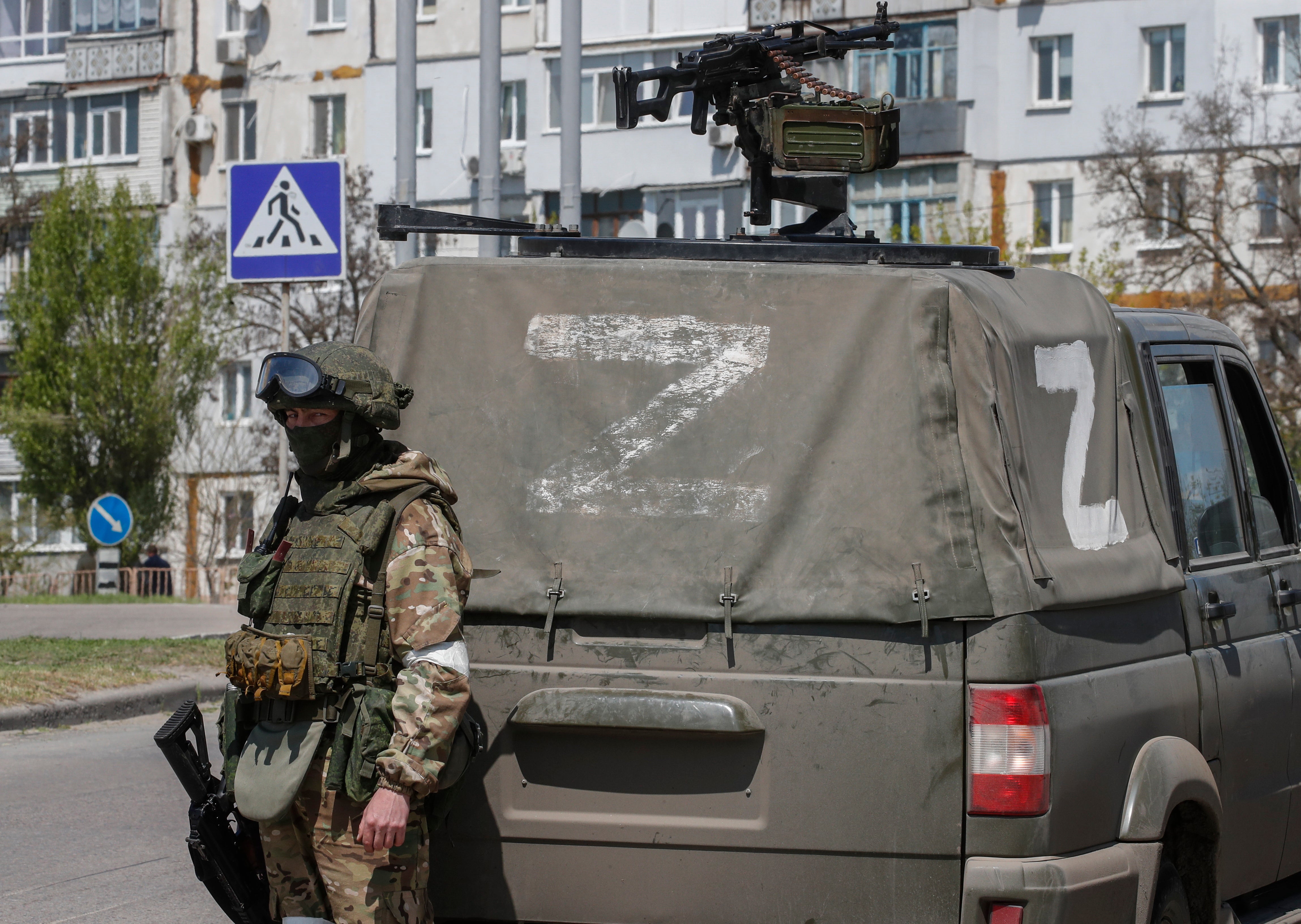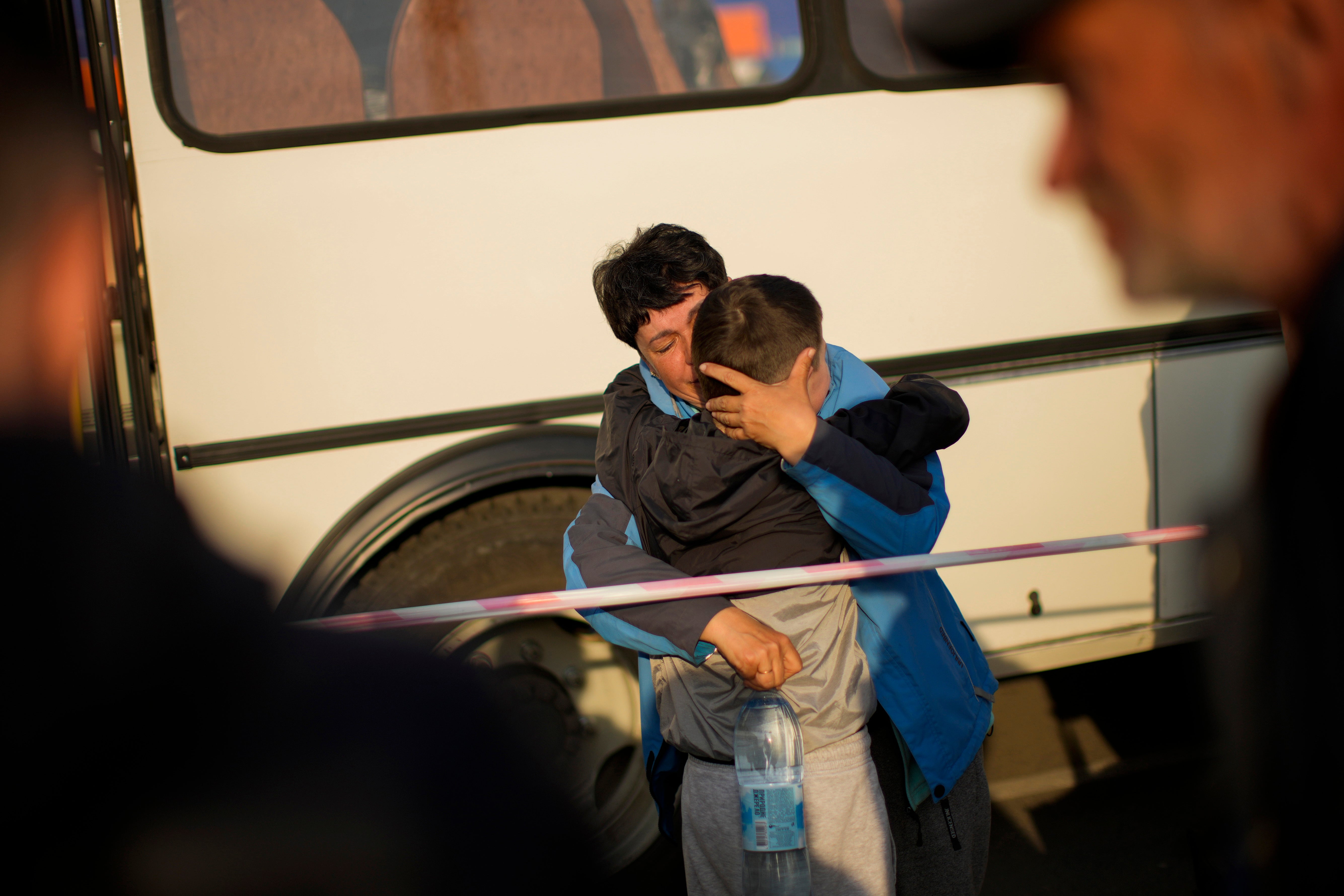
For the first few days after the Russian soldiers rolled into the Ukrainian city of Berdyansk, Katya, 34, stubbornly joined the demonstrations against the invaders every day.
The southeastern port city – like many along the Azov Sea – was largely Russian-speaking before the war.
But despite this, as the soldiers marched in, men, women and teenagers gathered in central streets and squares chanting that the Russian occupiers should “go home”.
Around them, armoured cars scrawled with the letter Z crawled across town, while soldiers took over all the main administrative buildings. The radio station, occupied by Moscow’s men, began blaring President Putin’s propaganda.
Residents were determined to stand their ground until people started to disappear.
“From day one they pointed guns at us as we gathered but then they started applying more force gradually,” Katya says, clutching her 8-year-old daughter Sophia just moments after having successfully fled the occupied town.
“The first week and a half was military police, then actual soldiers, then they started shooting in the air, handcuffing and taking people away.”
She says she finally gave up on the rallies when two of her friends were kidnapped. Rumours spread that some of the detainees were being forcibly deported to Russia.
“My friends were eventually returned a few days later, but they were broken,” she recalls with a catch in her throat.
“We have no idea what happened to them. I have never seen anyone so terrified. They stopped talking to us. They stopped talking at all.”
Anastasia, 18 who had fled Melitopol, about 120km west of Berdyansk, also a predominantly Russian-speaking city in the Zaporizhzhia region, says she knows of two girls who joined protests and organised strikes, and also vanished.
“They are still missing,” the international law student adds anxiously. “We don’t know whether they are still in Melitopol or outside the country.”

In the early days of President Putin’s ferocious invasion of Ukraine, hundreds if not thousands of citizens took to the streets in occupied cities to protest the advance.
But as Moscow has withdrawn from Kyiv, unleashing the full fury of its army on the south and east of the country, the crackdown on critics has only intensified, making it too dangerous to hold public protests. Instead partisan attacks on Russian positions have been on the rise, while the bombing and shelling is ongoing.
And now, 100 days into the war, Ukrainians argue that the crackdown on the protests and silencing of dissent, as well as the disappearances of critics, is all part of Moscow’s goal for Ukraine that goes beyond merely physically taking ground.
Russia vehemently denies this but the testimonies of those who have fled occupied territory speak of a subtler war, a cultural and demographic one that may have a deeper and deadlier impact on Ukraine than the battle scars.
The Ukrainian authorities themselves are worried in particular about the forcible transfer of citizens.
Lyudmila Denisova, Ukraine’s human rights ombudsman, last week claimed that as many as 1.5 million Ukrainian citizens, including hundreds of thousands of children, have been “illegally removed” to Russia since the war began. She said that they are subjected to “filtration camps” in the east of Ukraine before crossing.
Western intelligence sources speaking to American media estimate lower numbers that range from tens of thousands of people to as many as one million.
They say it is a programme of forced dislocation, aimed at cementing control and diminishing Ukrainian national identity, an action some human rights activists have gone as far as to call “cultural genocide”.

It is impossible to independently verify the numbers who have left Ukraine for Russia, or what percentage of them did so under duress.
Russia vehemently denies it is forcibly transferring the population, which is illegal under international law, insisting no one has been coerced.
Two weeks ago, Russian defence minister Sergei Shoigu claimed the movement of people to Russia was intended “to avoid casualties among the civilian population”.
He said since the beginning of the “special military operation” more than 1.37 million people have been “evacuated” from the dangerous regions of the country.
But in several interviews The Independent conducted with citizens from occupied towns, they spoke of how relatives under heavy bombardment were offered an impossible choice: stay and die, or go to Russia. Several families who fled through Russian-held territory also said they were (falsely) told at checkpoints that the Ukrainians were not taking any internally displaced people, and that they would be turned around.
Other families, and also officials from the Ukrainian Red Cross, said often the only humanitarian aid allowed into Russian-held areas was Russian aid. Families were told they would starve if they didn’t accept Russian food parcels and help.
This, many fear, is part of the active “Russification” of the east and south of the county.

“There were mass protests at the beginning against this but they have now been crushed. Activists have been kidnapped and tortured and reappeared in videos ‘apologising’ for their activity,” says Victoria, 38, a Ukrainian language teacher speaking to The Independent in Zaporizhzhia after she had just fled Berdyansk.
She says she escaped over fears she would become a target because of her work after Russian forces came to education centres trying to change the curriculum.
“They were going into schools and making threats that either you work with us and our curriculum or you don’t and suffer the consequences,” she adds.
“I felt afraid speaking Ukrainian. I was scared to be there as a teacher of Ukrainian language,” she says.
That has only worsened now. Just ahead of 9 May – which in Russia is known as Victory Day, commemorating the Soviet Union’s defeat of Nazi Germany – in Melitopol, the newly appointed pro-Russian interim authorities ordered the Ukrainian flag on the main square to be replaced with a Soviet Red Army one.
Other Red Army insignia now scatter buildings across the town.
In a further step of “Russification,” Mr Putin signed a decree last week simplifying the process for residents of the regions of Zaporizhzhia and neighbouring Kherson to acquire Russian citizenship and passports.
It extends a scheme already available to residents of areas controlled by Russian-backed separatists in Ukraine’s Donetsk and Luhansk regions, where Moscow has issued around 800,000 passports since 2019.
Ivan Fedorov, the exiled mayor of Melitopol, tells The Independent the Russians even ordered that everyone living in his city has to have a Russian passport. He says Russian forces also cut off the internet and phone lines and barred citizens from leaving the city via private cars. He says the Russian army had held up an evacuation convoy of around 1,000 people from the city.

The Independent was not able to verify that Russian passports were now mandatory or that citizens were barred from leaving Melitopol by car.
Mr Fedorov was kidnapped by Russian forces on 11 March and held for six days before being handed over to the Ukrainian authorities in a prisoner swap. Russia appointed its own pro-Russian mayor.
“They are trying to destroy the Ukrainian identity using such steps and they are preparing for a fake referendum to make Melitopol and other occupied territories part of Russia,” he says.
“We don’t know how many of the population have been taken by force to Russia. We know that Russia kidnapped 500 citizens in the last month [from Melitopol] but we don’t know where they are,” he adds.
For the citizens, their greatest fear is that the war, as it rolls into its next 100 days, will not only change the physical landscape of the country but its very demographic and identity.
“Melitopol and other occupied cities feel like the USSR in the 1990s, they’ve cut us off and forced Russia on us,” says Anatasia, as she prepares herself for the gruelling onwards journey west.
“I don’t know what will happen, but I’m afraid for the future.”







